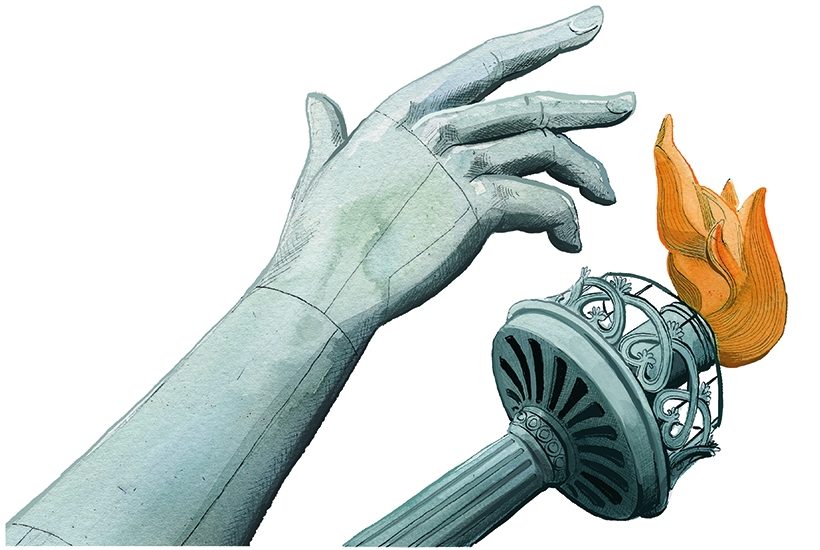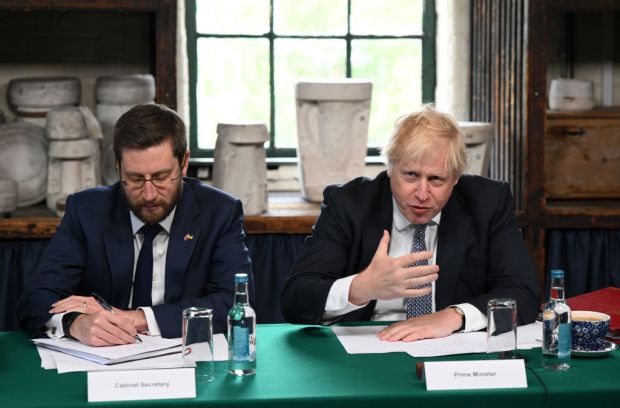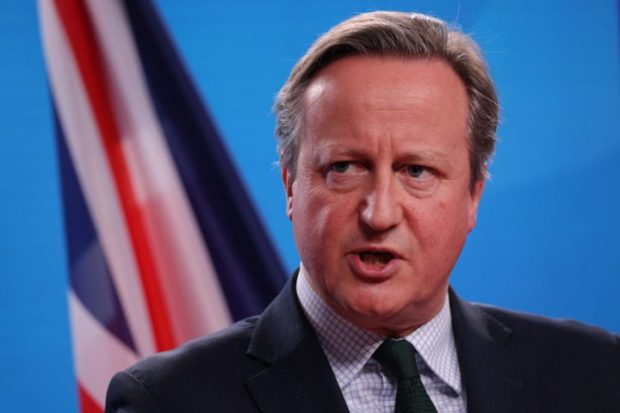Liberalism hasn’t had its sorrows to seek of late but its misfortunes show no sign of abating. The confluence of national populism and coercive progressivism, and the refusal of the non-aligned but sympathetic soft-right and soft-left to break with the culture wars, gives liberalism little chance of reasserting itself. This comes, too, as domestic and external threats to the liberal order continue to pile up. Far from a break with the authoritarian trends of recent years, 2021 has the makings of another annus illiberalis.
1) Trump is going, his politics may not be
The grim, demeaning scenes at the US Capitol ought to hasten Donald Trump’s departure from the White House but relief that the Trump era is closing seems optimistic. The nice, presentable, Mitt Romney wing of the GOP is going to do its damnedest to take the party back but, as Sir Keir Starmer is learning on this side of the Pond, a party that goes fringe is not easily returned to the centre.
De-Trumping the GOP may prove even more difficult than de-Corbynising the Labour Party. For one thing, Trump’s brand of tacky nationalism garnered 74 million votes, the highest-ever tally for a Republican or the loser in a presidential election. Even after the MAGA insurrection in DC, any number of ambitious senators and governors will be readying their attempts to recreate Trumpism without Trump. This is impossible, since there is no ‘ism’, only Trump, and imitating his sneering belligerence would ring as odd as mimicking Reagan’s sunny optimism or Obama’s collected coolness. But many will try and so the coarsening of American politics and public life will continue.
Nor will those 74 million voters go away. A significant segment of white America feels under siege from demographic and cultural change and resents elite institutions that alternately deny and celebrate this transformation. Joe Biden embarks on his presidency with a ready-made coalition of let-downs and left-behinds that, if properly tended by a convincing national Republican figure, could flip the House or Senate (or both) in two years’ time. The GOP deserves a lengthy spell in the cold but there is no guarantee it will get one.
Trump’s presidency was not entirely without merit. His Middle East policy (pro-Israel, pro-normalisation, hawkish on Iran) bore more and riper fruit than any president in living memory. He also correctly identified the illiberalism inherent in the new progressive orthodoxy and made haphazard moves in the direction of criminal justice reform while investing some resources in addressing opioid addiction. Those actions stand despite the low character of the president responsible for them, in much the same way that Nixon being a crook, a liar and an antisemite does not invalidate the Environmental Protection Agency and Clinton’s perjury has no bearing on the Family and Medical Leave Act. They do not, however, elevate the man beyond the rank of vulgar demagogue nor do they excuse the many more acts of violence he inflicted upon American ideals and the republic itself. He was and remains the least American president in American history.
What he has kindled will not easily be doused. The United States is not going to come together after January 20. Fine speeches will be given and senators will extend hands but America will remain polarised, gun sales will spike, politics will become more tribal and democracy further undermined by the competing visions of catastrophe now routinely posited should an election, congressional vote or Supreme Court nomination go the wrong way. A 2020 study into political polarisation (hat tip: Liam Duffy) concluded that partisan bias in the US ‘does approach levels of ethnic parochialism in Bosnia and Kosovo, suggesting how partisan identities may be “balkanising” in the United States’. The fatalistic view that America is two nations sharing one country should not be acceded to but neither of the two ascendant ideologies in US politics — nationalism and progressivism — is capable of repairing the republic.
2) Biden will struggle to fix America
A Biden administration might have staved off these problems but it has probably arrived 20 years too late. Joe Biden is a liberal pragmatist in the vein of Hubert Humphrey and in an earlier time could have represented a generous expanse of the American political scene, from tax-and-spend progressives and gently redistributionist centrists to Reagan Democrats and bleeding-heart Republicans. America’s social and political fragmentation has put such a coalition beyond his reach and changes within the Democrat Party will only make it more difficult to coax away moderate Republicans.
America lacks leadership and above all it lacks moral leadership. The storming of the Capitol brought this home in the moral surrender of the GOP and the moral vacuity of its condemners in the Democrat Party, the mainstream media and civil society. A mob, encouraged by the President of the United States, breached the Senate in an attempt to obstruct the confirmation of an election. This un-American carnage called for clear, thunderous declamation, yet while the words that came brought volume there was a weightlessness to them because of who they came from.
They rebuked ‘an unspeakable assault on our nation’ who, asked whether mobs had the right to tear down Christopher Columbus statues, had shrugged: ‘People will do what they do’. They denounced ‘that Trump mob that attacked the citadel of our democracy’ who, mere months ago, had demanded ‘show me where it says protesters are supposed to be polite and peaceful’. They deplored a ‘domestic terrorist attack’ on Capitol Hill who, last summer, had proclaimed ‘there needs to be unrest in the streets’. The point is not that one articulation of violence excuses another, nor even that moral parity exists between them, but that the legitimacy of violence has become a debate within mainstream US politics.
At the very time when it is needed to confront a nationalist and populist right, American liberalism has been annexed by progressivism, with its corrosive identity politics, politically and racially contingent standards and authoritarian impulses towards dissent. The fundamentals of the American project — individual freedom, ordered liberty, republican self-government — can only be secured by a reassertion of political liberalism in the two main parties and the wider culture.
3) Brexit isn’t done
Britons should not delude themselves that these are matters purely for our transatlantic cousins. On paper, the conclusion of the Brexit process ought to mean the end of a particular grip on politics by the right, the exorcism of the Europe boogeyman after which normal politics can resume. This assumes that Brexiteers are single issue voters and Brexit a single issue. In fact, it may be just the beginning of a longer populist moment, a disengagement not just from European political institutions but from the values of those institutions. You do not spend that long striving for your country’s ‘independence’ only to leave in place the identity, culture and national story of the side you strived against.
For some time now, Patrick O’Flynn has been contributing pieces to Coffee House whose headlines invariably contain the words ‘Nigel Farage’ and ‘why the Tories should be worried’. Anyone who disregarded his warnings could be about to learn a hard lesson. The Tories should be worried about Farage — they should never have stopped — but so should liberals. As O’Flynn documents, Farage’s Reform UK will take votes from the Tories’ right-wing flank, but it will also put on the table issues that currently reside on the hard-right fringe but have the potential to capture the mainstream imagination. O’Flynn cites Civil Service reform, the Licence Fee and deregulation but Reform would be well-placed to wage war against the Tories on crime, perhaps placing the Human Rights Act or even our membership of the European Convention on Human Rights in the crosshairs.
This would cause political problems for the Tories but not half the misery it would bring liberals. The Tories can fix their problems the way they often do — by adopting Farage’s most popular policies as their own. Liberals would find themselves on the wrong side of a whole slate of culture wars. Far from the peak of post-recession right-wing populism, Brexit may have just been the Level One boss.
4) The BBC is in trouble
Nothing warrants liberals’ pessimism as urgently as the future of the BBC. Research from YouGov finds only a third of Britons believe the BBC represents their values while a third say the Corporation’s values have become less like theirs. It follows Ofcom’s annual report, which documented declining reach among under 35s and recorded only 54 per cent of Britons agreeing that BBC News is impartial. The government’s decision not to decriminalise Licence Fee non-payment is a stay of execution, not a commutation.
The BBC’s problem is threefold — cultural, social and regulatory. The Corporation is out of step with large sections of the public, a reflection of institutional factors and an employee profile that is narrowly metropolitan, similarly educated, culturally progressive and politically homogenous. BBC staff often chirp something to the effect that ‘if both sides say you’re biased, you must be doing something right’, but in truth all it means is that you are alienating two audiences instead of one. In fact, it’s many more than two. While the Corporation’s Brexiteer and Corbynista critics get much of the attention, the situation is direr still in Scotland, where the BBC lost nationalists during the independence referendum and is at risk of losing unionists in its over-correction.
The second and third branch of the troika are actually the bigger threats. The BBC is struggling to keep pace with social changes that have altered our consumption habits and displaced old technologies and delivery systems. The Corporation has tried with iPlayer, BBC Sounds and its participation in BritBox but none of these have arrested the demographic shift: the BBC’s audience is getting older.
Finally, it will only become more difficult to justify the compelled funding of the BBC to demographics raised on a digital culture of free. Worse, subscription streaming services and crowdfunded YouTube channels probably alienate younger audiences from the licence fee rather than establish a link between payment and quality content. Platforms like Patreon allow users to fund their favourite YouTubers, TikTokers and Instagrammers; the licence fee is like a compulsory charge to support all of YouTube, TikTok and Instagram.
The BBC is culturally at odds with significant segments of the UK and straining to keep up with changing viewing habits. The more substantial threat, though, is that it is simply becoming less relevant to more licence fee payers.
5) Speech is becoming less free
The turn against freedom of expression goes to the heart of the distinction between liberalism and progressivism. Liberals are not absolutist about speech protections and some even diverge hard on these questions (see e.g. Joel Feinberg’s offence principle versus Ronald Dworkin’s right to ridicule). While they may disagree where the line should be drawn, and whether the merits of expressive liberty are moral, utilitarian or consequentialist, liberals generally believe in maximising ‘the liberty to know, to utter, and to argue freely according to conscience’.
Progressives take a markedly different view of the nature and value of expression itself and the scope of its free exercise. In progressivism, speech is not only an expressive act communicating or advocating an idea but a quasi-physical behaviour that, if deemed to exert ‘privilege’, employ unsanctioned terminology, or offend certain individuals or groups, constitutes a harmful action. This emanates from — though aggressively expands — the concept of assaultive speech as proposed by critical race theorists like Richard Delgado and Jean Stefancic. For today’s progressives, assaultive speech captures not only racial epithets or Nazis marching through Skokie but commonly-held opinions about race, immigration, gender, and sexuality expressed in mainstream language. Liberals start from the assumption that speech is worthwhile and limits should be minimal, progressives from the assumption that speech is harmful and limits maximal.
The progressive view of expressive activity is not limited to the political left. The SNP’s Hate Crime Bill and the Conservatives’ Online Harms Bill are products of this speech authoritarianism, although the former goes much further in encroaching on expressive liberty while the latter is not wholly without merit. It seems unlikely that 2021 will see the defeat of the SNP legislation and, if it did, Nicola Sturgeon’s government would simply introduce it again in a different guise. The Tory Bill has marginally more chance of being stopped, or satisfactorily redrafted, though its statist provisions unsurprisingly command the support of the Labour Party.
One of the consequences of the hijacking of liberalism by people who are not liberals is that a bedrock liberal principle like expressive freedom has been recast as anathema. It is not. Without expressive freedom there is no liberalism and no longer any point in trying to pursue it. It would be best all round if progressives and liberals accepted their fundamental differences — on freedom of expression and many other matters — and went their separate ways.
6) Big tech is too big
Twitter’s decision to ban Donald Trump from its platform is, on its face, nothing more than the enforcement of a terms of service agreement. Twitter has a policy against the ‘glorification of violence’ and it deemed the President’s tweets on the Capitol Hill riot to violate it, citing ‘the risk of further incitement of violence’ in announcing its decision. Angela Merkel objected to Twitter’s action, as have a number of French government ministers, on the grounds that lawmakers rather than Silicon Valley should determine the limits of freedom of speech. (Their actual concern is that a San Francisco-based company could do to a European politician what it has done to Trump.)
Twitter is free to decide who it wants using its platform and the parameters of acceptable user conduct. As a public company, it answers to its shareholders and if they disapprove of the Trump ban they will no doubt make their displeasure known. Besides, if tech companies are going to be chastised every time they boot racists and conspiracy theorists, the message they will learn is: don’t police your content. The prevalence of extreme users and content would only grow and prompt more draconian measures — by companies themselves or by government — down the line.
That’s reasonable enough as far as it goes but it neglects the potential for big tech to distort the ideas economy and game democratic outcomes by deciding who gets to speak and about what. When these firms act against certain posts or posters, they undermine the argument that they are merely platforms rather than publishers. When they act against a sitting president and, more often than not, users sympathetic to him, they open themselves to the charge that they are exploiting their dominance of the digital public square to skew the political process in their preferred direction. No company should be obliged to support a particular app but, then, no company should enjoy such a near-monopoly that the withdrawal of its services can render such a tool effectively unviable.
Most positions taken on this issue are politically contingent. If Rupert Murdoch bought Google tomorrow, progressives would return to campaigning against corporate influence in politics and conservatives would go back to declaiming government intervention in the free market. What should concern liberals is the monopolistic power of social media, its potential for misuse and the clamour for more state involvement in the digital marketplace.
In the dreamy techno-libertarianism of the 1990s, an unregulated cyberspace was going to liberate us all from state and corporate control. Instead, it has concentrated power in the hands (and servers) of NorCal hippie-sociopaths, busy hoovering up our data as they try to remake the world in the image of the US state its own denizens no longer want to live in. Their excesses all but guarantee a backlash that will inevitably go beyond competition enforcement and privacy protections into regulation of content and platforms.
Big tech is now so big that, whether you allow it to grow further or try to cut it down to size, digital liberty will take a kicking either way.
7) Religious freedom is under threat
A disproportionate — if delicious — slice of the religious freedom debate is taken up by the subject of cakes. Whether it’s the confections of the Ashers Baking Company in Northern Ireland or Masterpiece Cakeshop in Colorado, the question of where a Christian cake designer’s liberty of conscience ends and legal protections against non-discrimination in public accommodation begin keeps popping up on dockets across the West.
While the competing rights implicated are important, a more insidious threat to individual conscience is creeping into the public conversation in Europe. In the Central Jewish Consistory of Belgium case in December, the Court of Justice of the European Union upheld a Flemish law requiring the stunning of livestock before slaughter, which makes the preparation of kosher and some halal meat impossible. The Curia’s ruling that the Belgian regimen struck ‘a fair balance… between the importance attached to animal welfare and the freedom of Jewish and Muslim believers to manifest their religion’ effectively declares that animal welfare trumps the religious liberties of human beings. Should other member states follow Belgium, it will become infinitely more difficult to be an observant Jew or Muslim in the EU.
The UK should pay particular heed to this development. There is already a burgeoning campaign against dhabihah (halal slaughter) and shechita (kosher slaughter) that crosses conventional dividing lines of right and left and hopes to capitalise on the public’s ardent — if contradictory — feelings about animals. Current controversies over cultural and national identity create ripe circumstances for an ugly and divisive battle over the rights of religious minorities and the wellbeing of livestock. As the legal academic James Mendelsohn notes, ‘an intensified culture war over “Britishness” could include battles over shechita’, and he documents the nexus of hostility from animal welfare activists, mainstream conservatives, secularism campaigners and the far-right.
While anti-halal agitation is typically associated with nationalists and anti-Islam demagogues, the ethics of non-stun slaughter are a priority for an array of organisations. The National Secular Society wants an end to the religious exemption which allows some animals to be slaughtered without stunning and, until such time, compulsory labelling of meat so prepared. The Social Democratic Party, nominally a patriotic, socially conservative alternative to the Labour Party, is positively obsessed with these matters. One third of its animal welfare policies are about non-stun slaughter in a country where just one per cent of cattle, three per cent of calves, and ten per cent of chicken aren’t stunned.
Whether it is those who hide behind animal rights to make the UK more inhospitable for observant minorities, or those who sincerely believe that animals have a right to be slaughtered in a particular way that trumps the human right to religious liberty, efforts to further restrict or proscribe non-stun slaughter are illiberal and intolerant.
Good-faith prohibitionists may tell themselves that a ban would not, in intent or effect, harm Jews or Muslims and would ask only that their religious beliefs conform to contemporary norms about animal welfare. They could still freely practise their religion, they’d just have to change their religion. This is an analogue to the leftist pose that Jews are perfectly welcome in their political parties and movements provided they disavow Zionism and any connection to Israel. Consciously or otherwise, it is an assertion that to be good, loyal Britons, devout Jews and Muslims must choose their country over their religion.
Until I visited Israel, I had never understood what Jews meant when marvelled at how easy it was to be Jewish there. High living costs, an overpriced housing market, rabbinical conservatism, compulsory national service and the continuing threat of terrorism should — and do — make life very difficult. Yet one of the advantages of a Jewish state is that you only have to think about your Jewishness as much as you want, for everything around you is already organised with your Jewishness (and, for the religious, your Judaism) in mind. You don’t have to scour labels for a hechsher or hope the local shop sells soya milk or wonder if your lamb was slaughtered halachically.
We can’t recreate that kind of comforting certainty for British Jews and Muslims but we can and should strive to make it as hassle-free as possible to be strictly kosher or halal in the UK. Toleration is intrinsic to liberalism and toleration of religious liberty especially so given the history of religion and government in this country. Many liberals would rather avoid this battle but it is coming all the same and when it does, those arguing for freedom of conscience and faith practice will be firmly in the minority.
8) Antisemitism is still the issue
If 2020 was the year the world got woke, 2021 is likely to confirm that we are still asleep to the most insidious form of prejudice. Antisemitism is the racism that least interests anti-racists. It is largely absent from their polemics against ‘white privilege’ and their training programmes. Going by their silence (or worse) on Labour antisemitism, it is also the one form of racism that is not literal ‘violence’ and does not create ‘unsafe’ environments.
Yet by any measure anti-Jewish hatred is only growing. In the United States, where Jews account for 2.2 per cent of the population, 60.2 per cent of hate crimes are against Jews. In 2019, Canadian antisemitism statistics broke records for the fourth year in a row and the country now sees an average of six anti-Jewish incidents a day. Germany recorded more than 2,000 antisemitic crimes in 2019, an increase of 13 per cent on the previous year, including a far-right gunman’s assault on a synagogue on Yom Kippur. Berlin’s equivalent of MI5 warns there has been a ‘steep rise’ in ‘criminal offences, including acts of violence, against Jews and Jewish institutions in Germany’ which is requiring the security services to be ‘especially vigilant’. Between January and June 2020, the Community Security Trust documented its third-highest tally of antisemitic incidents in the first half of any year since it began keeping records in 1984. While incidents dipped during the first two months of lockdown, they spiked once restrictions were eased and post-lockdown assaults were ‘marked by increased levels of aggression’.
While the far-right and Islamists do the heavy lifting when it comes to violence against Jews, the left continues to outdo itself in the political antisemitism stakes. It is seemingly a Herculean task to criticise the security policies of a tiny Middle Eastern nation without slipping into a 12-tweet thread about the Rothschilds. Not to be outdone, even mainstream right-wingers are reverting to a conspiracist explanation of political events centred on Jewish perfidy. While there are non-sectarian, sovereignty-based critiques of technocracy and supranationalism, there is slippage into a paranoid chauvinism in which George Soros and other ‘globalists’ function as the latest Elders of Zion.
Ruth Wisse contends that antisemitism is ‘the modern organisation of a politics against the Jews’ in which opposition to Jews ‘became a stand-in for opposition to liberalising reforms, and a substitute for real evidence of harms done by liberalism to the societies in which it was advancing’. Antisemitism should be a pre-eminent concern for liberals not only because it targets an ethno-religious minority but because it targets them in service of its rage against liberal pluralism. The organisation of politics against the Jews is becoming more organised and more dangerous.
9) China’s authoritarianism continues to spread
China is a human rights abuser on a grand scale. It denies its citizens free and fair elections, competitive political parties, an independent media and autonomous trade unions. It is systematically dismantling what democracy it had previously permitted in Hong Kong. In Xinjiang, it has rounded up an estimated one million Uyghurs and placed them in ‘re-education camps’ while the West looks on, shaking its head occasionally.
Not content with repressing its own people, the Chinese Communist Party (CCP) exports its illiberalism through soft power, in particular financial power, which it deploys both to normalise its abnormal governing system in global opinion and to undermine liberal democracies, especially those that would seek to bring the People’s Republic into compliance with international law and norms. The Centre for Strategic and International Studies (CSIS) observes that ‘China’s efforts to influence and shape public discourse and political outcomes within targeted countries go well beyond the kinds of legitimate public diplomacy that all governments engage in’. CSIS points to Australia as a case study in Beijing’s efforts and recounts tactics including bribery of politicians, putting ex-politicians and think tanks on the payroll, astroturfing pro-CCP campaigns, and infiltrating Australian Chinese media and cultural bodies. Australia has begun to distance itself, even calling for an independent investigation into the origins of coronavirus, which has prompted harsh economic punishment from Beijing.
The CCP’s reach extends far beyond Canberra. Beijing is pouring billions into Africa, a strategic lynchpin for trade and a large bloc of countries to bring into China’s sphere of influence. The Commons foreign affairs committee has found ‘alarming evidence’ that China and other autocratic regimes are ‘seeking to shape the research agenda or curricula of UK universities, as well as limit the activities of researchers on university campuses’. The committee cited examples such as seizing articles referring to Taiwan, monitoring students critical of the regime and coopting academic organisations. In the United States, China’s grip is so tight that it can even get American basketball teams to denounce their own players for tweeting the words: ‘Fight for freedom, stand with Hong Kong’.
If Iran is the world’s leading state sponsor of terrorism, China is the foremost state sponsor of authoritarianism. Prising Western institutions from Beijing’s clutches is among the most pressing tasks facing liberals today. However, the crippling impact of China’s pandemic, its resulting economic crisis and a distracted international community erect daunting obstacles. In current elite discourses there is also less interest in threats that cannot be framed as outgrowths of Western policy or white supremacy. China is winning because it has what we lack: political will.
10) The extreme has gone mainstream
What makes liberalism especially vulnerable is that extremism is no longer simply attacking the mainstream — it is becoming the mainstream. Nationalist strongmen like Hungary’s Viktor Orbán do not trouble this generation of conservatives in the way they would earlier champions of limited government and a rules-based global order. Once stoutly liberal institutions like the Washington Post and New York Times scan the Islamist assault on secular, republican France and decry the victim for provoking the victimiser. The progressives who have captured these newspapers cling to their universal ideological frame (‘white supremacists; white supremacists everywhere’) like customers of a psychic medium who have paid top dollar for their reading and are determined to see the colour red and the number 7 somewhere.
The Kingean ideal of overcoming racism has been shoved aside by a fringe academic theory of anti-racism that renders race essential, racism heritable and both inescapable — original sin with no possibility of redemption. Another fixture of activist academia that has seeped into the productive world off-campus is gender identity theory. It has spread through politics, media and corporate culture like only buzzword-studded intellectual junk could, but its practical effects reach far beyond the pronoun charades and strutting victimhood the ideology encourages. Hard-won legal protections are being willed out of existence by the determined dishonesty of zealots and imitators who don’t fully understand how or why they came to feel so zealous.
The extreme invasion of the mainstream has been facilitated in part by liberals’ reluctance to break out that most reactionary of words: No. Liberals lost the confidence to claim exclusivity over liberalism, to act as gatekeepers and keep out cranks, to reject without apology bad ideas and bad thinking whatever sympathetic guise they came in. We lost confidence, too, against authoritarians and convinced ourselves that being a liberal meant being inoffensive and accommodating. We forgot that liberalism is worth fighting for.
A liberalism with the fight back in it is a sweet, blissful thought, yet our basic problem is not pluck but numbers. When I studied political theory at university, I would read Mill, Tocqueville and Madison and marvel at how magnanimous liberals were towards minorities. Always fretting over tolerance, pluralism and how to protect the minority from a tyrannical majority. It wasn’t until I was a little older and had shed my undergraduate naiveté that I realised why: in most places and in most ages, liberals are the minority. Freedom is still a radical idea. Not freedom in the abstract, where everyone is for it, but in the everyday, where it’s hard and unloveable and doesn’t fix the potholes.
Do pessimism and liberalism mix? Better than you might think. A dose of realism about our predicament could be exactly what liberals need. There is something exhilarating about embracing the scale of the odds against you. It summons the blood, quickens the pace. It’s how you know you care enough to battle on, even to defeat. It’s how you know it’s worth it.
Got something to add? Join the discussion and comment below.
Get 10 issues for just $10
Subscribe to The Spectator Australia today for the next 10 magazine issues, plus full online access, for just $10.




















Comments
Don't miss out
Join the conversation with other Spectator Australia readers. Subscribe to leave a comment.
SUBSCRIBEAlready a subscriber? Log in